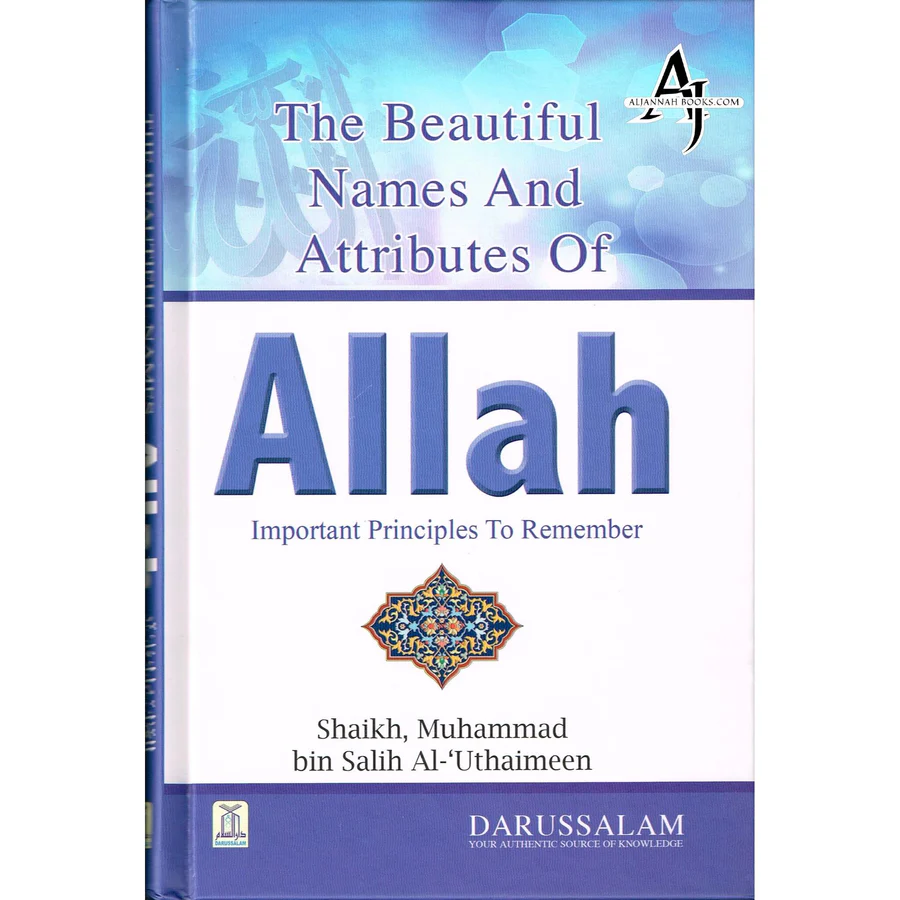In Islam, great emphasis is laid upon knowing and contemplating the Names and Attributes of Allah. They reveal to him His glory, benevolence, and wisdom in such a manner that he directs himself towards worshiping Him with true devotion. In Beautiful Names and Attributes of Allah: The Important Principles to Remember, Muhammad bin Salih Al-Uthaimeen expounds on this essential topic in an explanatory manner to shed light on how to treat the Names of Allah with respect and understanding.
This blog delves into the major concepts in the book and the deep spiritual wisdom that it brings.
Why Reflecting on Allah’s Names and Attributes is Important for Believers
The Names and Attributes of Allah are not just descriptions; they form the foundation of a Muslim’s belief. Through them, we come to know Allah’s infinite mercy, power, and knowledge, which shape our relationship with Him.
When believers learn and reflect on Allah’s Names, it brings a deeper sense of awe, love, and submission. For instance, knowing Allah is Ar-Rahman (The Most Merciful) reminds us of His compassion, while understanding Al-Hakeem (The All-Wise) strengthens our trust in His divine plan.
Overview of the Book: Key Themes and Structure
Muhammad bin Salih Al-Uthaimeen explains the subject clearly, dispelling misconceptions and pointing out the necessity of referring to authentic sources of Islam.
1. The Importance of Allah’s Names and Attributes
This chapter explains why knowledge of Allah’s Names and Attributes is essential to Tawheed, the Oneness of Allah. It explains how contemplating these Names enhances the worship and life of a Muslim.
2. Guidelines for Interpreting Allah’s Names
The book outlines essential principles to ensure a correct understanding, including:
Authenticity:
Only Names and Attributes established in the Quran and Sunnah should be recognized.
Perfection Without Comparison:
Allah’s Attributes are beyond human comparison, emphasizing His uniqueness.
Comprehensiveness:
Each Name and Attribute reveals a specific aspect of Allah’s perfection.
3. Common Errors in Understanding Allah’s Names
He said, “Muhammad bin Salih Al-Uthaimeen mentions that the misinterpretation of Allah’s Names is the misconceptions of anthropomorphism or denial of specific Attributes.
Important Principles to Keep in Mind When Reflecting on Allah’s Names
To fully benefit from the knowledge of Allah’s Names and Attributes, one must adhere to the following:
1. Avoid Distortion or Misinterpretation
Allah’s Names must be understood as He revealed them, without adding or altering their meanings. For example, As-Sami’ (The All-Hearing) signifies Allah’s complete awareness, not limited by human perception.
2. Refrain from Speculating Beyond What Is Revealed
Human intellect is limited, and attempting to define Allah’s Names and Attributes beyond what is stated in the Quran and Sunnah leads to error.
3. Reflect on Their Application in Worship
Every Name should provoke certain acts of worship. For example, the fact that Allah is Al-Ghafoor (The Forgiving) should lead a person to ask for forgiveness all the time.
Divine Benefits of Learning Allah’s Names and Attributes
Learning Allah’s Names and Attributes affects both belief and action very significantly.
1. Deepening Love and Trust in Allah
The realization of Allah’s mercy, wisdom, and strength establishes an intimate relationship with Him. A Muslim finds solace in His ever-present presence and love.
2. Developing Worship and Supplication
Knowing Allah’s Names enables Muslims to call upon Him better in supplication. For instance, invoking Ar-Razzaq (The Provider) for sustenance is directly linked to the Attributes of Allah in the prayer.
3. Enhancing Tawheed
Considering Allah’s Attributes enhances Tawheed, ensuring that the Muslim person directs all his acts of worship to Allah alone without any partners.
Ways of Integrating Allah’s Names in Daily Life
1. Learn and Reflect
Prophet Muhammad (peace be upon him) said:
Allah has ninety-nine Names; whoever memorizes them will enter Paradise.” (Sahih al-Bukhari, 2736)
Learn these Names and reflect on their meanings as part of your daily activities.
2. Use the Names in Duas
Use Allah’s Names in your prayers to make them more heartfelt and specific. For example, when asking for mercy, use Ar-Rahim (The Most Merciful).
3. Observe Allah’s Signs in Creation
Ponder the presence of Allah’s in your own world. The intricate design within nature manifests His Attribute of Al-Khaliq – The Creator.
Common Misunderstandings and Their Clarifications
1. Comparison of Allah’s Attributes to Human Characteristics
Some mistake Allah’s Attributes, such as hearing or seeing, in comparison to human capabilities. The book emphasizes that Allah’s Attributes are unique and cannot be compared to human capabilities.
2. Allowing Allah to be Deficient
Assuming that some or Qualities are unique to certain circumstances dilutes Allah’s all-round perfection. Every Name encapsulates a part of his infinite grandeur.
Why This Book is a must-read for all Muslims
Muhammad bin Salih Al-Uthaimeen’s book offers clarity and profundity, making it a very useful book in the quest of Muslims to know Allah and understand him better.
1. Combines Simplicity with Authenticity
The book explains deep concepts in a manner that is not difficult to understand but is not at the cost of accuracy.
2. Motivates Towards Practical Implementation
The book is not purely theoretical but motivates readers to incorporate the and Attributes of Allah in their daily worship.
3. Clears Misconceptions
In this age of misinformation, the book is a sure guide for understanding one of the most important aspects of Islamic theology.
Conclusion: Connecting with Allah Through His Names and Attributes
Understanding the Names and Attributes of Allah is a journey that is lifelong in its nature, enriching faith and transforming worship. Beautiful and Attributes of Allah by Muhammad bin Salih Al-Uthaimeen is an invaluable guide to this journey, providing principles, clarifications, and insights rooted in the Quran and Sunnah.
Through reflection on Allah’s , believers not only strengthen their bond with the Creator but also find comfort, guidance, and purpose in their lives.
Read more: A Brief Illustrated Guide to Understanding Islam By I. A. Ibrahim



